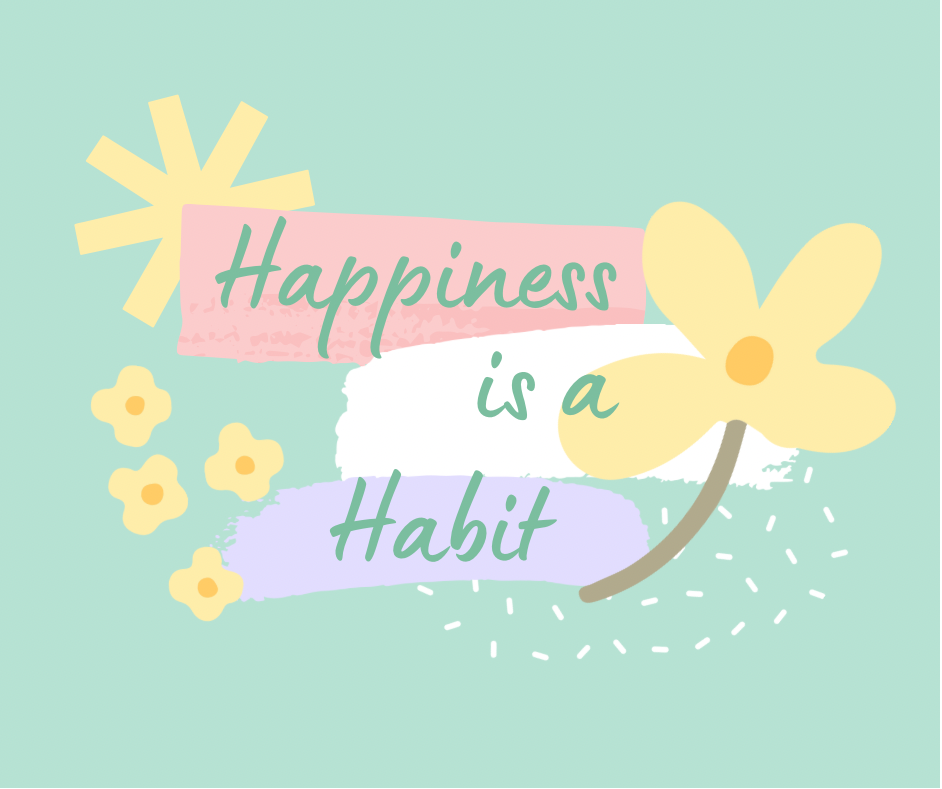Don't Worry Be Happy! If only it was that simple. Bobby McFarin’s iconic song has a simple message and a catchy tune, however happiness can be elusive. We often wish happiness to our friends, loved ones, and ourselves on special occasions and there are many songs about happiness such as Walking on Sunshine (Katrina and the Waves), “Happy” (Pharell Williams), and Sunshine on My Shoulders (John Denver).
We have fairy tales and romantic comedies that end in the characters living “Happily Ever After.” The pursuit of happiness is so important that it is one of the unalienable rights the founding fathers declared in the Declaration of Independence. Happiness is presented in our society as a feeling that should be easy to access, however it doesn’t always come so easily. We often carry the belief that happiness depends on the things we have or what happens to us (e.g., getting a promotion, buying a house, being in a relationship, etc.). While certain experiences do bring happiness, studies show that we have the ability to create happiness internally, and many of the things that we associate with happiness may be fleeting rather than long lasting. We have the ability to influence our own happiness rather than being at the mercy of some fortune or circumstance that befalls us. I’ve never met a person who thought they were too happy and needed to tone it down. Can you imagine? That is a problem I would like to have. Rather, most people seek to increase their happiness, particularly when they realize all of the things they thought would make them happy did not.
What Exactly is Happiness?
If happiness is so important, why is it that we struggle to even define what it is? If you asked several people what the key happiness is you will most likely get several different answers. In order to study a concept, we have to clearly define it. A relatively new area of psychology, called Positive Psychology aims to enhance overall well-being rather than focusing on reducing human suffering and emotional distress (e.g., depression, anxiety, etc.). As a clinical psychologist, clients typically seek my services to help them address challenges in their life. Similar to seeing a physician—people go to the doctor when they are sick or injured rather than figure out ways to improve their health. However, building on strengths and fostering resilience in a preventative manner can enhance overall well-being. It doesn’t mean we won’t experience the variety of emotions in response to the ups and downs of life. Being happier doesn’t mean we don’t ever feel sadness, frustration, etc. However, we may feel those emotions less often. If we have the ability to build a stronger foundation for overall positive mood and well-being, why wouldn’t we?
Over the past two decades researchers began focusing on happiness in order to better understand what it is and how we can increase it. Happiness is made up of positive emotions we have in relation to pleasurable experiences or accomplishments which occur in our lives. These may include feelings of pleasure, joy, comfort, gratitude, hope, contentment, flow (e.g. in the zone), among many others. This is why it is challenging to define—happiness can be many things to many people. The one constant of happiness is that it’s a subjective state of emotional well-being that changes over time. Needless to say, happiness has several dimensions and empirically validated measures have been created to assess individuals’ levels of happiness. When we are able to measure happiness we can also examine what improves it and track it.
The University of Pennsylvania offers free and anonymous questionnaires you can complete online. UPenn is one of the leaders in Positive Psychology research. You need to register, but that’s it. Here is the link to the UPenn’s questionnaires. You will see several different measures about happiness listed (among others) and descriptions.
The Mental Tune-Ups Happiness Challenge
So, how happy are you? Are you ready to find out? I invite you to join me for the MTU Happiness Challenge. Over the next 6 weeks I will discuss what contributes to happiness, what doesn’t, and provide strategies and tools you can use to enhance overall happiness and well-being. For those of you who love data, you will be able to track your progress (totally optional of course). If you simply want to read the newsletter and learn about the topics each week, that’s fine too. Perhaps you want to increase happiness or simply want to understand the concept better, either way I find the topics I’ll be covering in the next several weeks are universally relevant to people. If you want to participate in the MTU Happiness Challenge here is what it involves:
Take the happiness assessments described above. You will need to do this before you start practicing the skills/strategies I present in subsequent newsletters. The goal is to get a baseline and see if it your level of happiness changes over time.
Each week I will present different strategies to try/practice. Some will be additive to previous skills/strategies, while others will be noticing and reducing behaviors that impede happiness. They will build on one another so by the end you will have several skills to utilize. The goal is to practice them over time in order to make them habits. The more you practice, the more natural and easy they are to utilize.
Retake the happiness assessments. At the end of the challenge, you can take the same assessments again. You will have the opportunity to see how your happiness changes over time by comparing your orignial assessments to the follow-up assessments you take after you practice the skills. Don’t worry, I’ll remind you. :)
That’s it! If you choose to simply follow along on the happiness journey without taking the assessments, that is fine too. The information is for you to use as you wish. Skills I will be covering during the challenge will include topics such as gratitude, kindness to others, self comparison, conditional statements, etc. Improving happiness is one of my favorite topics and I hope you find it as interesting as I do! Next week I will talk about gratitude and why gratitude journals have become so popular.




